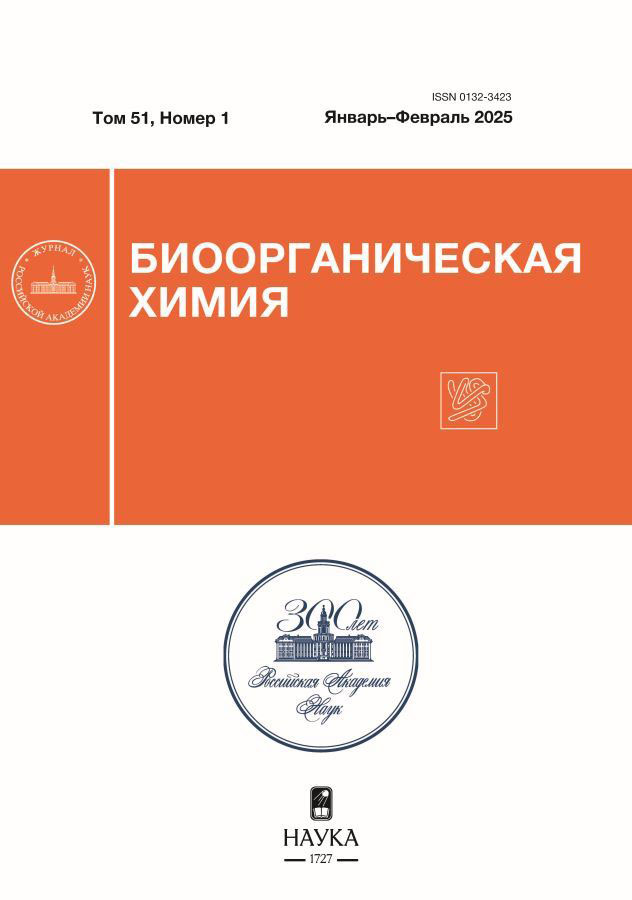Synthesis and study of hepatoprotective activity of new uracil derivatives
- Autores: Khazimullina Y.Z.1, Gimadieva A.R.1, Khairullina V.R.2, Kudoyarov E.R.3, Karimov D.O.3, Mustafin A.G.1
-
Afiliações:
- Ufa Institute of Chemistry – Separate Subdivision of the Ufa Federal Research Centre of the Russian Academy of Sciences
- Federal State Budgetary Educational Institution of Higher Education “Ufa University of Science and Technology”
- Federal State Budgetary Scientific Institution “Ufa Research Institute of Occupational Medicine and Human Ecology”
- Edição: Volume 51, Nº 1 (2025)
- Páginas: 32-42
- Seção: Articles
- URL: https://medjrf.com/0132-3423/article/view/683094
- DOI: https://doi.org/10.31857/S0132342325010037
- EDN: https://elibrary.ru/LZXKSN
- ID: 683094
Citar
Texto integral
Resumo
Pyrimidine base derivatives, having a wide spectrum of pharmacological activity along with low toxicity, are used as active ingredients of many drugs. Thus, many compounds of the uracil series have antitumor, anti-inflammatory, antiviral, immunomodulatory effects, in connection with which the synthesis of new biologically active derivatives of the pyrimidine series is relevant. It is known that the mechanism of hepatotoxicity of chemical compounds is largely associated with the activation of lipid peroxidation, therefore, uracil derivatives containing a proton-donor group in position C5 were chosen as objects of study, which significantly increases the antioxidant properties of the compound. For the synthesis of uracil derivatives at N1, N3 positions, modification of 5-hydroxy- and 5-amino-6-methyluracils with pre-protected C5 functional groups with various alkyl substituents was carried out. The method of preliminary etching of cells with the hepatotoxicant tetrachloromethane and their treatment with the studied compounds was selected as a study of hepatoprotective activity. The introduction of various alkyl substituents at the N1, N3 positions of 5-hydroxy and 5-amino-6-methyluracils leads to an increase in the solubility of these compounds, the hepatoprotective activity of the synthesized compounds was revealed. New di- and monoalkyl derivatives of 5-hydroxy- and 5-amino-6-methyluracil were obtained, their hepatoprotective activity was tested in vitro. According to the test results, five of the new 20 synthesized compounds promote cell survival when pre-treated with tetrachloromethane.
Texto integral
Sobre autores
Yu. Khazimullina
Ufa Institute of Chemistry – Separate Subdivision of the Ufa Federal Research Centre of the Russian Academy of Sciences
Autor responsável pela correspondência
Email: yulialion91@mail.ru
Rússia, Ufa
A. Gimadieva
Ufa Institute of Chemistry – Separate Subdivision of the Ufa Federal Research Centre of the Russian Academy of Sciences
Email: yulialion91@mail.ru
Rússia, Ufa
V. Khairullina
Federal State Budgetary Educational Institution of Higher Education “Ufa University of Science and Technology”
Email: yulialion91@mail.ru
Rússia, Ufa
E. Kudoyarov
Federal State Budgetary Scientific Institution “Ufa Research Institute of Occupational Medicine and Human Ecology”
Email: yulialion91@mail.ru
Rússia, Ufa
D. Karimov
Federal State Budgetary Scientific Institution “Ufa Research Institute of Occupational Medicine and Human Ecology”
Email: yulialion91@mail.ru
Rússia, Ufa
A. Mustafin
Ufa Institute of Chemistry – Separate Subdivision of the Ufa Federal Research Centre of the Russian Academy of Sciences
Email: yulialion91@mail.ru
Rússia, Ufa
Bibliografia
- Голиков С.Н., Саноцкий Н.В., Тиунов Л.А. // Общие механизмы токсического действия. Москва, 1986. 279 с.
- Арчаков А.И., Карузина И.И. // Вестник АМН СССР. 1988. № 1. С. 14–24.
- Мышкин В.А., Ибатуллина Р.Б., Бакиров А.Б. // Поражение печени химическими веществами. Функционально-метаболические нарушения, фармакологическая коррекция. Уфа: Гилем, 2007. 180 с.
- Губский Ю.И. // Коррекция химического поражения печени. Киев: Здоровья, 1989. 166 с.
- Гимадиева А.Р., Чернышенко Ю.Н., Абдрахманов И.Б., Мустафин А.Г. // Синтез, модификации и биологическая активность урацилов. Уфа: Гилем, 2013. 176 с.
- Петрова И.В., Катаев В.А., Мещерякова С.А., Николаева К.В. // Медицинский вестник Башкортостана. 2013. № 4. C. 64–67.
- Фаттахов А.Х. // Синтез и исследование таутомерных и кислотно-основных превращений биологически активных C(5)-, N(1)-, N(3)-замещенных производных урацила. Автореф. дисс. к.х.н. Уфа, 2011. 23 с.
- Фаттахов А.Х., Лобов А.Н., Гимадиева А.Р., Мустафин А.Г., Абдрахманов И.Б. // Вестник Башкир. ун-та. 2012. Т. 17. № 4. С. 1710–1714.
- Гимадиева А.Р., Хазимуллина Ю.З., Белая Е.А., Зимин Ю.С., Абдрахманов И.Б., Мустафин А.Г. // Биомед. химия. 2015. Т. 61. С. 765–769. https://doi.org/10.18097/PBMC20156106765
- Гимадиева А.Р., Мышкин В.А., Мустафин А.Г., Чернышенко Ю.Н., Фаттахов А.Х., Абдрахманов И.Б., Толстиков Г.А. // Докл. Акад. наук. 2013. Т. 448. № 4. С. 484–486.
- Мустафин А.Г., Гимадиева А.Р., Хазимуллина Ю.З., Абдрахманов И.Б., Сафиуллин Р.Л., Байметов Б.З. // Патент RU2700687C1, опубл. 19.09.2019.
- Мустафин А.Г., Гимадиева А.Р., Хазимуллина Ю.З., Абдрахманов И.Б., Сафиуллин Р.Л., Байметов Б.З. // Патент RU2700422C1, опубл. 17.09.2019.
- Мустафин А.Г., Гимадиева А.Р., Хазимуллина Ю.З., Абдрахманов И.Б. // Патент RU2806327C1, опубл. 31.10.2023.
- Гимадиева А.Р., Хазимуллина Ю.З., Абдрахманов И.Б., Мустафин А.Г. // Журн. прикладной химии, 2022, Т. 95. Р. 382–388. https://doi.org/10.31857/S0044461822030112
- Шульпекова Ю.О. // Рос. мед. журнал. 2003. № 5. С. 300.
- Маевская М.В., Ивашкин В.Т., Ивашкин К.В., Луньков В.Д., Люсина Е.О., Зозуля В.Н., Лещенко В.И. // Терапевтич. архив. 2019. Т. 91. № 2. С. 109–117.
- Lipinski C.A., Lombardo F., Dominy B.W., Feeney P.J. // Adv. Drug Deliv. Rev. 2001. V. 46. P. 3–26. https://doi.org/10.1016/S0169-409X(00)00129-0
- Гордон А., Форд Р. // Спутник химика. М.: Мир, 1976. 544 с.
- Way2Drug. https://www.way2drug.com/PassOnline/
- Organic Chemistry Portal. https://www.organic-chemistry.org/prog/peo/
- admetSAR. http://lmmd.ecust.edu.cn/admetsar2/
- Методика определения цитотоксичности веществ МТТ-тестом на культуре нормальных клеток человека HEK-293. CTП14.621.21.0008.12-2015. Черноголовка: Издательство ИФАВ, 2015. 13 с.
- Кудояров Э.Р., Каримов Д.Д., Кутлина Т.Г., Каримов Д.О., Мухаммадиева Г.Ф., Хуснутдинова Н.Ю., Данилко К.В., Гимадиева А.Р., Бакиров А.Б. // Токсикологич. вестник. 2019. № 4. С. 38–42. https://doi.org/10.36946/0869-7922-2019-4-38-42
Arquivos suplementares













